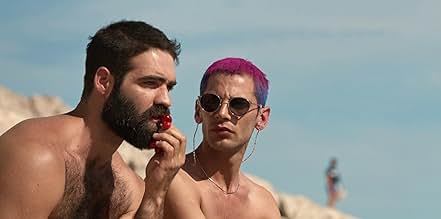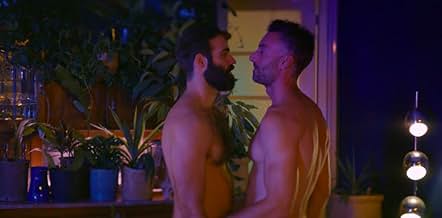ÉVALUATION IMDb
6,7/10
1,5 k
MA NOTE
Ajouter une intrigue dans votre langueWhile having a day-long swim at Athens' queer beach, best friends Demos and Nikitas recall the events of a recent summer in the prospect of turning them into a screenplay for Nikitas' featur... Tout lireWhile having a day-long swim at Athens' queer beach, best friends Demos and Nikitas recall the events of a recent summer in the prospect of turning them into a screenplay for Nikitas' feature debut.While having a day-long swim at Athens' queer beach, best friends Demos and Nikitas recall the events of a recent summer in the prospect of turning them into a screenplay for Nikitas' feature debut.
- Director
- Writers
- Stars
- Prix
- 4 victoires et 16 nominations au total
Avis en vedette
The storyline isn't terrible, but it's evident that the film's primary target audience is the Greek community. The lead actor's frequent nudity seems calculated to draw in viewers and generate buzz, but in my opinion, it detracts from the overall authenticity of the film. Tsiantoulas's performance is inconsistent, indicating a lack of effective direction from the filmmaker, which might have better served to guide him to a more convincing portrayal. Additionally, the film straddles the line between comedy and drama without fully committing to either genre. In summary, while it's worth a watch, particularly for a Greek audience, it's best to approach it with tempered expectations.
This is an incredibly well-constructed movie, brimming with irony and following the tragic yet thought-provoking patterns reminiscent of ancient philosophers like Plato. The narrative subtly explores the complexities of human emotions, where the love between the main characters remains purely platonic, highlighting themes of connection beyond the physical.
A special mention goes to the dog, who delivered a surprisingly nuanced performance. Her presence is not just charming but integral to the plot, adding emotional depth and symbolizing loyalty and companionship in ways that enhance the storytelling.
The film's unique sense of humor stands out, masterfully blending subtle wit with a post-ironic visual narrative that keeps the audience engaged. This clever approach elevates the movie, offering layers of meaning that invite reflection long after the credits roll.
I give it an extra 100 out of 100 for its brilliance-both in its humor and innovative narrative structure. It's been over 100 minutes of pure cinematic delight, leaving me entertained and impressed in equal measure.
A special mention goes to the dog, who delivered a surprisingly nuanced performance. Her presence is not just charming but integral to the plot, adding emotional depth and symbolizing loyalty and companionship in ways that enhance the storytelling.
The film's unique sense of humor stands out, masterfully blending subtle wit with a post-ironic visual narrative that keeps the audience engaged. This clever approach elevates the movie, offering layers of meaning that invite reflection long after the credits roll.
I give it an extra 100 out of 100 for its brilliance-both in its humor and innovative narrative structure. It's been over 100 minutes of pure cinematic delight, leaving me entertained and impressed in equal measure.
If you watch an heap of gay cinema, especially from South America, then this kind of story isn't really that novel. There are plenty where hunky heroes like "Demos" (Yorgos Tsiantoilas) has a best mate "Nikitas" (Andreas Labropoulos) - who is obviously quite keen on his pal who doesn't really reciprocate in the way he wants, and who takes advantage of the local nudist beach and fairly vibrant gay community to get naked for much of the film and get down to some furious jogging with "Thymios" (Vasilis Tsigristaris) whilst on the rebound from a four year relationship with "Panos" (Nikolaos Mihas) with whom he looks after their dog "Carmen". Still with me? Well what now ensues is a rather predicable plot wrapped within the concept that the first two characters are thinking of writing a movie about this emotionally charged scenario. Along the way, there is plenty of soul-searching as just about everyone has to deal with their demons and hopefully emerge the better person. There's a much more continental-style dose of casual shagging that might raise eyebrows amongst those more used to a more Anglicised take on sex with subtle cutaways and perfectly placed pot plants (though it's not quite "Theo and Hugo" (2016) either). It's really a film about finding yourself and seeing what's squarely in front of you, but by using the film-making arc to give the audience a degree of observational objectiveness, it rather made me feel like a prurient fly on a wall where I didn't always belong (or care). The acting is natural and adequate, it's beautifully shot and there are plenty of rousing arias to enliven it, but I'm afraid I found it just a bit over-complicated and unoriginal.
The movie-within-a-movie narrative is a popular cinematic storytelling approach, but, to my knowledge, writer-director Zacharias Mavroeidis's fourth feature outing is the first film to make use of it in the LGBTQ+ genre. This endearing gay comedy-drama tells the story of two long-time best friends, Demosthenes (Yorgos Tsiantoulas), a former actor-turned civil servant, and Nikitas (Andreas Labropoulos), a former actor-turned aspiring filmmaker, who try to come up with a concept for the would-be auteur's latest movie project while hanging out together at a nude beach on the stunningly beautiful Greek seacoast. They toss around a variety of ideas, but they get the most traction out of a story and script based on the waning days of Demos's relationship with his former partner, Panos (Nikolaos Mikas), two summers earlier, a breakup for which Nikitas had a tolerance-testing front row seat. The events of that awkward, protracted separation are depicted here in a series of flashbacks in which the duo struggles to figure out where things went wrong and why, an examination that ultimately ends up revealing more about them as individuals than as a couple. In the process, the film presents a refreshingly authentic, often-revealing look at the dynamics of relationships and friendships among gay men, particularly when it comes to matters of honesty and commitment, both in and out of partnership contexts. And, along the way, the authors of this evolving production simultaneously look for ways to spice up their work, an exercise in inspired creativity, emboldened social activism, fiercely courageous self-acceptance, constrained moviemaking economics, challenging family relations and even benevolent pet care. However, the breadth of material presented in this story is, admittedly, a lot to skillfully massage into a coherent finished product. The filmmaker seems sincere enough in what he's trying to say, but he also comes across as somewhat inundated in trying to pull it all together into a neat and tidy package. To be sure, there are many earnest moments and flashes of brilliant humor here, but there's also a tendency to meander and a good deal of extraneous material that could have easily been deleted. This is perhaps most noticeable in the final act, where the momentum starts to sputter, almost as if the director doesn't quite know how to wrap things up. "The Summer with Carmen" truly represents an ambitious effort with decidedly mature, thoughtful sensibilities running throughout (arguably much more so than what one typically sees in many LGBTQ+ films), but it's also one that could have benefitted greatly from an editor unafraid to make the necessary cuts to allow it to shine as brightly as it might have.
When Robert Rosson and Robert Parrish had way too much footage to work with editing the (eventual) Oscar-winning ALL THE KING'S MEN, they hit upon the idea of finding the central moment of each scene, then cutting out everything that wasn't 100 feet before or after that moment.
The creative team for this movie should have done something similar. There's way too much establishing and throat-clearing at the beginning of every scene, and way too much resolution and tying up loose ends at the finish of every scene.
When you add to this that the characters aren't developed so there's no one to care for, the movie becomes a big bore. I was disappointed. The only thing that kept me watching was the possibility of more on-screen nudity.
The creative team for this movie should have done something similar. There's way too much establishing and throat-clearing at the beginning of every scene, and way too much resolution and tying up loose ends at the finish of every scene.
When you add to this that the characters aren't developed so there's no one to care for, the movie becomes a big bore. I was disappointed. The only thing that kept me watching was the possibility of more on-screen nudity.
Le saviez-vous
- AnecdotesThe golden rules of screenwriting listed in the film are: 1/ every movie has 3 acts 2/ every movie has a hero 3/ every hero has a goal 4/ every hero changes in pursuit of their goal
- GaffesAt the final scene you can see the boom mic at the bottom edge of the frame meanwhile Nikitas and Demosthenes have their last talk.
- ConnexionsFeatures Washingtonia (2014)
Meilleurs choix
Connectez-vous pour évaluer et surveiller les recommandations personnalisées
- How long is The Summer with Carmen?Propulsé par Alexa
Détails
- Date de sortie
- Pays d’origine
- Langue
- Aussi connu sous le nom de
- The Summer with Carmen
- Lieux de tournage
- sociétés de production
- Consultez plus de crédits d'entreprise sur IMDbPro
Box-office
- Brut – à l'échelle mondiale
- 21 235 $ US
- Durée
- 1h 46m(106 min)
- Couleur
- Rapport de forme
- 1.85 : 1
Contribuer à cette page
Suggérer une modification ou ajouter du contenu manquant
































